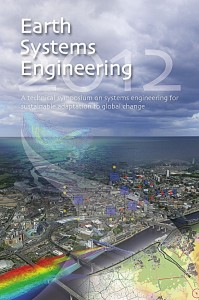M. B. Beck, R. Villarroel Walker, and M. Thompson (2012)
Dawson RJ, Walsh CL and Kilsby CG (eds.) (2012) Earth Systems Engineering 2012: A technical symposium on systems engineering for sustainable adaptation to global change, Centre for Earth Systems Engineering Research, Newcastle University, U.K.
Abstract
The archetypal metabolism of the city is defined by the flows of energy and materials (carbon (C), nitrogen (N), phosphorus (P), water) entering the city from the rest of the global economy, then circulating around and through its economic, social, and industrial life, before returning to the city’s environment (and the global economy). The change we argue for is that of viewing nutrients not as pollutants — a perception entailed in the historic success of water-based systems for securing public health in cities — but as resources to be gainfully recovered. We expect such change to propagate from change in the “human” (local and very personal scale), through the “built” (city-wide scale), hence eventually to better stewardship of the “natural” (and global scale) component of coupled human-built-natural systems. We begin with a discussion of moral positions on the Man-Nature relationship and the material flows resulting therefrom. In theory, if material flows are to be changed, a map of the plural contending moral positions is first needed, in particular, in respect of contending notions of fairness. Empirical evidence from the renewal of London’s housing stock in the 1970s and 1980s, the siting of hazardous waste treatment facilities in Austria, and European work on decentralization and source-separation in wastewater management, is used to illustrate the theoretical basis of our opening argument. Two more in-depth case studies, in changing the metabolisms of the cities of Atlanta, USA, and London, UK, primarily through technological innovations, are then introduced. Foresight regarding future distributions of financial costs and benefits amongst plural stakeholders, should the change of outlook be made, is generated from a Multi-sectoral Systems Analysis (MSA) model (covering the water, energy, food, waste-handling, and forestry sectors). Upon these specific results is built the closing argument of the paper regarding matters of fairness in constructing (or dismantling) social legitimacy around the policies of urban infrastructure re-engineering that would be needed to recover the resources currently treated as pollutants.

Responses to “Changing the Metabolism of Coupled Human-Built-Natural Systems”